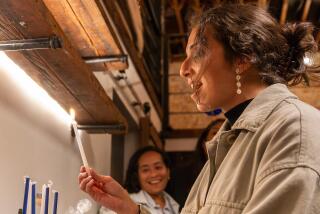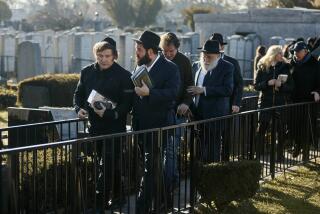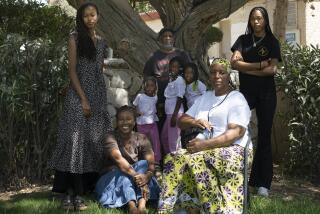India’s Jews Enjoy Religious Tolerance
- Share via
COCHIN, India — Far away from the holy wars among Hindus, Muslims and Sikhs, palm trees shade an outpost of the Jewish Diaspora where India offers its citizens religious tolerance.
“An American student sent a questionnaire asking why our young people had left for Israel,” said tax consultant and lawyer Jacob Cohen, wearing an Indian dhoti, the loosely wrapped cloth covering the lower half of the body.
“I just wrote: ‘Lunacy.’ ”
The Jewish youths are not fleeing the Hindu militancy of the northern Indian plains, the Sikh separatist violence of the Punjab, or the independence crusade of Kashmiri Muslims.
In Cohen’s opinion, they are abandoning a legacy of two millennia of peace and prosperity on India’s Malabar coast for army service, housework, hustle and cramped apartments in Israel.
“I can understand why you’d want to go to the land of your forefathers,” he said, “but not if you’re going to be a liability.
“They can’t fight. We’ve been living here in happiness and comfort for so long, we’ve lost our martial spirit.”
Cohen, 70, is one of just 26 Jews left in the southwestern port city of Cochin. They believe their forefathers arrived a little way up the coast at Cranganore in the 1st Century, way ahead of other foreign settlers.
The tiny community still cherishes folk memories of the hospitality that it received from local Hindus.
“It was as a result of the generosity and tolerance shown to the Jews . . . that India first earned the name as a land of tolerance and understanding of all religions,” retired merchant Samuel Koder wrote in his history of Cochin’s Jews.
Now there are more Hindu tourists than Jews in the 16th-Century synagogue at the bottom of the road called Jew Town.
The prayers from a nearby mosque can be heard in the synagogue, which keeps copper plates, dated around AD 400, recording the good fortune of the Jews in India.
“His Majesty, the King Lord Parkaran Iravi Vanmar . . . was pleased to make the following gifts,” reads the official translation of the text on the plates.
“A cloth spread in front to walk on, a palanquin, a parasol, a drum, a trumpet . . . to Joseph Rabban, the Prince of Anjuvannam, and to his descendants . . . so long as the world and moon exist.”
The idyll ended 1,000 years later as fighting erupted between members of the Jewish community. Local princes reclaimed the settlement of Anjuvannam, and the surviving Jews left for Cochin.
There they suffered their only pogrom. Portuguese Catholics found the port, gateway to hills rich in spices and to rumored treasures of gold and gems, and sacked Jew Town.
The surviving Jews readily adapted to the Dutch, who ousted the Portuguese, and then to the British, who removed the Dutch. When the Indians took over from the British in 1947, the Jews of Cochin adapted once again.
“We are, of course, Indians,” said Cohen.
The state of Israel was founded in 1948, however, and the exodus of Jews to Israel began. The Jews who are now in Cochin went, saw and came back.
“I could never have a life like this in Israel,” said Cohen, gesturing to his rambling Jew Town home, where peeling exterior paint is irrelevant, considering the Indian-style luxury supplied by servants.
But the extinction of the community seems imminent. Only three teen-agers are left and they, too, may feel the lure of Israel.
“We have got some trouble now,” said Koder, 84. “We must have 10 male Jews over the age of 13 for congregational prayer.” But often old age and sickness mean there are not enough.
“Then we conduct the service with the help of foreign Jewish visitors from Israel, the United States, Europe,” Koder said.
“Our young people think only of Israel,” Cohen said. “They don’t know that India is really our motherland.
More to Read
Sign up for Essential California
The most important California stories and recommendations in your inbox every morning.
You may occasionally receive promotional content from the Los Angeles Times.










